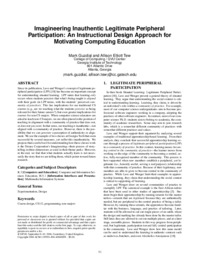Imagineering inauthentic legitimate peripheral participationan instructional design approach for motivating computing education
Mark Guzdial, Allison Elliott Tew
Publikationsdatum:
Zu finden in: ICER 2006 (Seite 51 bis 58), 2006
|
 |
 Diese Seite wurde seit 4 Jahren inhaltlich nicht mehr aktualisiert.
Unter Umständen ist sie nicht mehr aktuell.
Diese Seite wurde seit 4 Jahren inhaltlich nicht mehr aktualisiert.
Unter Umständen ist sie nicht mehr aktuell.
 Zusammenfassungen
Zusammenfassungen
 Since its publication, Lave and Wenger's concept of legitimate peripheral participation (LPP) [18] has become an important concept for understanding situated learning. LPP states that learning only occurs when students perceive that what's being taught is aligned with their goals (in LPP terms, with the students' perceived community of practice). This has implications for our traditional CS courses (e.g., are we teaching what the students perceive as being relevant for their future careers?), but even greater implications for courses for non-CS majors. When computer science educators are asked to teach non-CS majors, we are often placed in the position of teaching in alignment with a community of practice that does not, or does not yet, exist. In that sense, our teaching is inauthentic---not aligned with a community of practice. However, there is the possibility that we can generate a perception of authenticity or alignment. We use the example of two classes at Georgia Tech that seem successful by several measures, yet suffer this inauthenticity. We propose that a useful tool for understanding how these classes work is the Disney Corporation's Imagineering---their process of story-telling in three-dimensions as used in their theme parks. However, in the end, we find that what students actually learn is not necessarily the story that we are telling them, which points toward future research.
Since its publication, Lave and Wenger's concept of legitimate peripheral participation (LPP) [18] has become an important concept for understanding situated learning. LPP states that learning only occurs when students perceive that what's being taught is aligned with their goals (in LPP terms, with the students' perceived community of practice). This has implications for our traditional CS courses (e.g., are we teaching what the students perceive as being relevant for their future careers?), but even greater implications for courses for non-CS majors. When computer science educators are asked to teach non-CS majors, we are often placed in the position of teaching in alignment with a community of practice that does not, or does not yet, exist. In that sense, our teaching is inauthentic---not aligned with a community of practice. However, there is the possibility that we can generate a perception of authenticity or alignment. We use the example of two classes at Georgia Tech that seem successful by several measures, yet suffer this inauthenticity. We propose that a useful tool for understanding how these classes work is the Disney Corporation's Imagineering---their process of story-telling in three-dimensions as used in their theme parks. However, in the end, we find that what students actually learn is not necessarily the story that we are telling them, which points toward future research. Dieses Konferenz-Paper erwähnt ...
Dieses Konferenz-Paper erwähnt ...
 Personen KB IB clear | John Seely Brown , Allan Collins , Allan Fisher , Andrea Forte , Mark Guzdial , Jean Lave , Jane Margolis , S. E. Newmann , L. B. Resnick , Etienne Wenger | ||||||||||||||||||||||||||||||||||||
 Bücher |
| ||||||||||||||||||||||||||||||||||||
 Texte |
|
 Zitationsgraph
Zitationsgraph
 Zitationsgraph (Beta-Test mit vis.js)
Zitationsgraph (Beta-Test mit vis.js)
 3 Erwähnungen
3 Erwähnungen 
- Visual Program Simulation in Introductory Programming Education (Juha Sorva) (2012)


- ICER 2013 - International Computing Education Research Conference, ICER '13, La Jolla, CA, USA, August 12-14, 2013 (Beth Simon, Alison Clear, Quintin I. Cutts) (2013)
- Introduction to Computing and Programming in Python - 4th Edition (Mark Guzdial, Barbara J. Ericson) (2016)

 Anderswo finden
Anderswo finden
 Volltext dieses Dokuments
Volltext dieses Dokuments
 |  Imagineering inauthentic legitimate peripheral participation: Fulltext at the ACM Digital Library ( Imagineering inauthentic legitimate peripheral participation: Fulltext at the ACM Digital Library ( : :  , 496 kByte; , 496 kByte;  : :  Link unterbrochen? Letzte Überprüfung: 2020-11-28 Letzte erfolgreiche Überprüfung: 2020-06-28) Link unterbrochen? Letzte Überprüfung: 2020-11-28 Letzte erfolgreiche Überprüfung: 2020-06-28) |
 Anderswo suchen
Anderswo suchen 
 Beat und dieses Konferenz-Paper
Beat und dieses Konferenz-Paper
Beat hat Dieses Konferenz-Paper während seiner Zeit am Institut für Medien und Schule (IMS) ins Biblionetz aufgenommen. Beat besitzt kein physisches, aber ein digitales Exemplar. Eine digitale Version ist auf dem Internet verfügbar (s.o.). Aufgrund der wenigen Einträge im Biblionetz scheint er es nicht wirklich gelesen zu haben. Es gibt bisher auch nur wenige Objekte im Biblionetz, die dieses Werk zitieren.













 (
(

 Biblionetz-History
Biblionetz-History